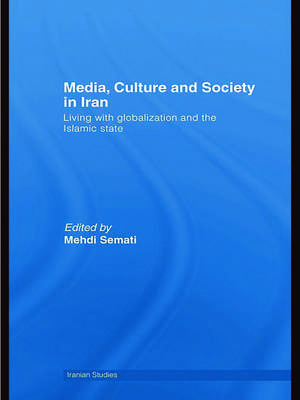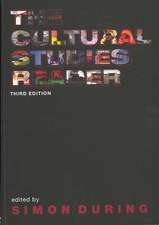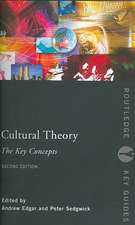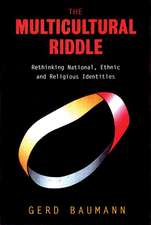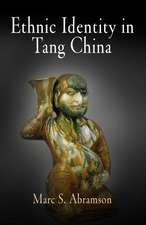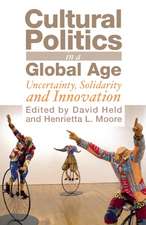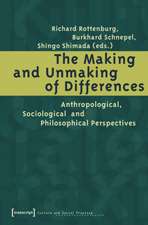Media, Culture and Society in Iran: Living with Globalization and the Islamic State: Iranian Studies
Editat de Mehdi Sematien Limba Engleză Hardback – 27 sep 2007
Featuring contributions from among the best-known and emerging scholars on Iranian media, culture, society, and politics, this volume uncovers how the existing perspectives on post-revolutionary Iranian society have failed to appreciate the complexity, the paradoxes and the contradictions that characterize life in contemporary Iran, resulting in a general failure to explain and to anticipate its contemporary social and political transformations.
| Toate formatele și edițiile | Preț | Express |
|---|---|---|
| Paperback (1) | 419.92 lei 6-8 săpt. | |
| Taylor & Francis – 4 feb 2010 | 419.92 lei 6-8 săpt. | |
| Hardback (1) | 1168.76 lei 6-8 săpt. | |
| Taylor & Francis – 27 sep 2007 | 1168.76 lei 6-8 săpt. |
Din seria Iranian Studies
-
 Preț: 154.25 lei
Preț: 154.25 lei -
 Preț: 310.03 lei
Preț: 310.03 lei - 18%
 Preț: 1053.92 lei
Preț: 1053.92 lei - 18%
 Preț: 1108.37 lei
Preț: 1108.37 lei - 25%
 Preț: 823.63 lei
Preț: 823.63 lei - 25%
 Preț: 823.99 lei
Preț: 823.99 lei -
 Preț: 449.41 lei
Preț: 449.41 lei - 18%
 Preț: 1068.18 lei
Preț: 1068.18 lei - 18%
 Preț: 997.90 lei
Preț: 997.90 lei -
 Preț: 389.38 lei
Preț: 389.38 lei - 18%
 Preț: 1055.51 lei
Preț: 1055.51 lei - 12%
 Preț: 299.52 lei
Preț: 299.52 lei -
 Preț: 442.68 lei
Preț: 442.68 lei - 18%
 Preț: 1059.84 lei
Preț: 1059.84 lei - 26%
 Preț: 848.57 lei
Preț: 848.57 lei - 25%
 Preț: 770.09 lei
Preț: 770.09 lei -
 Preț: 341.55 lei
Preț: 341.55 lei - 18%
 Preț: 1165.97 lei
Preț: 1165.97 lei -
 Preț: 437.13 lei
Preț: 437.13 lei -
 Preț: 436.14 lei
Preț: 436.14 lei - 18%
 Preț: 1117.07 lei
Preț: 1117.07 lei -
 Preț: 478.86 lei
Preț: 478.86 lei - 25%
 Preț: 570.60 lei
Preț: 570.60 lei - 18%
 Preț: 1114.70 lei
Preț: 1114.70 lei - 26%
 Preț: 822.01 lei
Preț: 822.01 lei - 18%
 Preț: 1000.27 lei
Preț: 1000.27 lei - 18%
 Preț: 1060.52 lei
Preț: 1060.52 lei -
 Preț: 412.70 lei
Preț: 412.70 lei - 18%
 Preț: 1054.71 lei
Preț: 1054.71 lei - 22%
 Preț: 328.20 lei
Preț: 328.20 lei -
 Preț: 430.94 lei
Preț: 430.94 lei - 18%
 Preț: 1055.51 lei
Preț: 1055.51 lei - 18%
 Preț: 1002.63 lei
Preț: 1002.63 lei - 25%
 Preț: 685.71 lei
Preț: 685.71 lei - 18%
 Preț: 1067.14 lei
Preț: 1067.14 lei - 18%
 Preț: 1118.65 lei
Preț: 1118.65 lei - 18%
 Preț: 1054.75 lei
Preț: 1054.75 lei
Preț: 1168.76 lei
Preț vechi: 1425.31 lei
-18% Nou
Puncte Express: 1753
Preț estimativ în valută:
223.75€ • 233.46$ • 187.56£
223.75€ • 233.46$ • 187.56£
Carte tipărită la comandă
Livrare economică 13-27 martie
Preluare comenzi: 021 569.72.76
Specificații
ISBN-13: 9780415772167
ISBN-10: 0415772168
Pagini: 294
Ilustrații: 9 b/w images, 14 tables and 9 halftones
Dimensiuni: 156 x 234 x 23 mm
Greutate: 0.6 kg
Ediția:New.
Editura: Taylor & Francis
Colecția Routledge
Seria Iranian Studies
Locul publicării:Oxford, United Kingdom
ISBN-10: 0415772168
Pagini: 294
Ilustrații: 9 b/w images, 14 tables and 9 halftones
Dimensiuni: 156 x 234 x 23 mm
Greutate: 0.6 kg
Ediția:New.
Editura: Taylor & Francis
Colecția Routledge
Seria Iranian Studies
Locul publicării:Oxford, United Kingdom
Public țintă
PostgraduateCuprins
Living with Globalization and the Islamic State: An Introduction to Media, Culture, and Society in Iran Mehdi Semati Part 1: New and Old Media in Iran 1. The Iranian Press, State and Civil Society Gholam Khiabany 2. The Politics of the Internet in Iran Babak Rahimi 3. Youth, Politics, and Media Habits in Iran Kavous Seyed-Emami 4. The Language of Rock: Iranian Youth, Popular Music, and National Identity Laudan Nooshin 5. The Politics of Satellite Television in Iran Fardin Alikhah 6. The Iranian Moral Panic over Video: A Brief History and a Policy Analysis Mahmood Shahabi 7. Sociolinguistic Aspects of Persian Advertising in Post-Revolutionary Iran Mohammad Amouzadeh and Manoochehr Tavangar 8. Trends in Contemporary Persian Poetry Alireza Anushiravani and Kavoous Hassanli 9. Iranian Émigré Cinema as a Component of Iranian National Cinema Hamid Naficy 10. Iranian Cinema and the Critique of Absolutism Zohreh T. Sullivan Part 2: Religion, State, and Culture 11. Fundamentalism, Gender, and the Discourses of Veiling (Hijab) in Contemporary Iran Fatemeh Sadeghi 12. Religious Intellectualism, Globalization, and Social Transformation in Iran Abbas Varij Kazem 13. Secularization in the Iranian Society Yousef Ali Abazari, Abbas Varij Kazemi and Mehdi Faraji Part 3: Epilogue 14. Whither Iran? Majid Tehranian.
Notă biografică
Mehdi Semati is Associate Professor of Communication at Eastern Illinois University, USA. His writings on international communication, cultural politics of global communication, popular media and cultural studies, media and terrorism, and Iranian media have appeared in various academic journals and books.
Recenzii
The puzzle of how a vibrant civil society has continued to thrive under a theocratic Islamic state in Iran has long baffled many scholars and analysts of Iranian politics. This wide-ranging collection of essays by a group of young scholars, based mostly in Iran, provides the most informative analysis of this complex relationship between the society and the state in Iran by exploring the role of the media (including the press, television, cinema, the internet, etc.), music, popular literature, and gender relations. It offers fresh perspectives on the contemporary Iranian political culture—as well as politics of culture—in the postrevolutionary period and should be of great interest to students of Middle East politics, communications theory, and cultural studies.
Ali Banuazizi, Professor of Political Science, Boston College, and Past President of the Middle East Studies Association
Iran is often seen as a series of frozen images, with angry clerics and anti-American shibboleths being the byproducts of a stultifying theocratic order. In this path-breaking book, a different Iran comes to life, as a number of authors challenge the prevailing impressions. From the politics of the internet to disquisition of religious discourse in the seminaries, Media, Culture and Society in Iran opens new vistas into this most complex of countries. For anyone interested in understanding the Islamic Republic, its tribulations and contradictions, its promises and ideals, there is simply no better guide.
Ray Takeyh, Council on Foreign Relations, author of Hidden Iran: Paradox and Power in the Islamic Republic.
If the world needed any reminder that Iranians, like any other people, are busy resisting domestic tyranny, defying globalized imperialism, and mapping out the contours of their own place in history, Mehdi Semati's judiciously edited volume is here to respond to that need. Through a succession of brilliant first hand accounts on media, culture, and civil society in Iran, the essays capably collected in this volume cut through the mind-numbing clichés that think tank analysts and their native mis-informers have fed the public at large. The rambunctious Iranian press, a thriving internet culture, the politics of its youths, their arts and music, the importance of satellite TV, a globalized cinema, the inner dynamics of a grassroots women's movement, and innumerable other minutiae of a struggling cosmopolitan culture come to life in this unprecedented and deeply informative book.
Hamid Dabashi, Hagop Kevorkian Professor of Iranian Studies and Comparative Literature, Columbia University, Author of Iran: A People Interrupted
Ali Banuazizi, Professor of Political Science, Boston College, and Past President of the Middle East Studies Association
Iran is often seen as a series of frozen images, with angry clerics and anti-American shibboleths being the byproducts of a stultifying theocratic order. In this path-breaking book, a different Iran comes to life, as a number of authors challenge the prevailing impressions. From the politics of the internet to disquisition of religious discourse in the seminaries, Media, Culture and Society in Iran opens new vistas into this most complex of countries. For anyone interested in understanding the Islamic Republic, its tribulations and contradictions, its promises and ideals, there is simply no better guide.
Ray Takeyh, Council on Foreign Relations, author of Hidden Iran: Paradox and Power in the Islamic Republic.
If the world needed any reminder that Iranians, like any other people, are busy resisting domestic tyranny, defying globalized imperialism, and mapping out the contours of their own place in history, Mehdi Semati's judiciously edited volume is here to respond to that need. Through a succession of brilliant first hand accounts on media, culture, and civil society in Iran, the essays capably collected in this volume cut through the mind-numbing clichés that think tank analysts and their native mis-informers have fed the public at large. The rambunctious Iranian press, a thriving internet culture, the politics of its youths, their arts and music, the importance of satellite TV, a globalized cinema, the inner dynamics of a grassroots women's movement, and innumerable other minutiae of a struggling cosmopolitan culture come to life in this unprecedented and deeply informative book.
Hamid Dabashi, Hagop Kevorkian Professor of Iranian Studies and Comparative Literature, Columbia University, Author of Iran: A People Interrupted
Descriere
Arguing that existing perspectives on contemporary Iran have not fully grasped the significant role of culture in Iran, this book examines modern culture and media in Iran through a wide range of topics.
